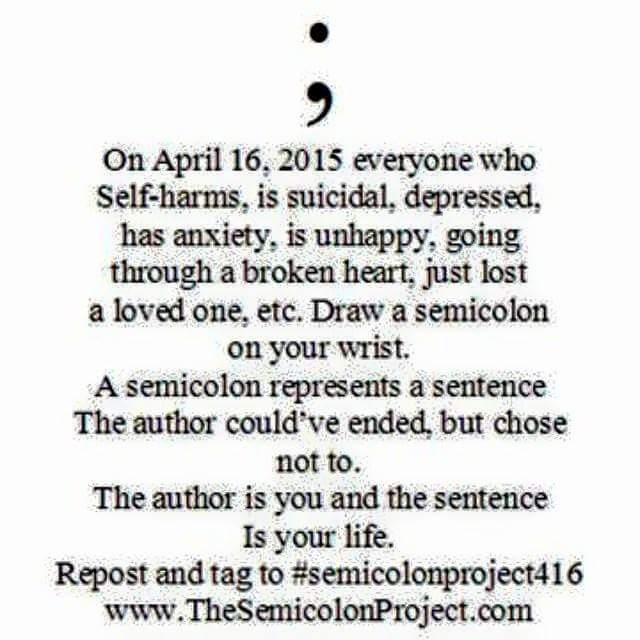Editor’s note: If you experience suicidal thoughts or have lost someone to suicide, the following post could be potentially triggering. You can contact the Crisis Text Line by texting “START” to 741-741
My heart has been heavy the past few days since the report of mental health advocate Amy Bleuel’s death was released.
For those who don’t know who Amy was, she pioneered a network of peer support via her nonprofit organization, Project Semicolon, founded in 2013. Project Semicolon exploded into social media consciousness in 2015 when pictures of semicolon tattoos inspired by the project took off and started spreading like wildfire. But I was a follower of the Project since 2014, when I came across a photo on Facebook dedicated to Semicolon Day:

Project Semicolon defines itself as being “dedicated to presenting hope and love for those who are struggling with mental illness, suicide, addiction and self-injury.” I can’t stress enough how important the project was to me as someone who has a past history of self-harm, who has struggled with depression and anxiety and is a suicide attempt survivor and the mother of a suicide attempt survivor.
Amy made it OK to talk about these things openly and touched so many lives with a small punctuation mark. Many who self-harm tend to hide what they do. The nature of the stigma has prevented many from seeking help or having hope for recovery. Suicide attempts often have similar stigmas attached and many suicide attempt survivors, suicide loss survivors or those considering suicide tend to feel alone even in the mental health community. Amy gave us a place there.
As an advocate for mental health as well as chronic illness, I admired and continue to admire Amy and her message of inclusion and support. Amy was a suicide attempt survivor who struggled with depression and post-traumatic stress disorder (PTSD) herself and whose father died by suicide. A few days ago, it was indeed confirmed Amy died by suicide.
People tend to think mental health advocates have all the answers, but oftentimes we’re really still in the battle with them. We’re navigating the same waters, but don’t necessarily have a lighthouse in sight, a life jacket or even know how to swim in uncharted waters. We just know we’re called to help others.
Sometimes in helping others, our own self-care takes a backseat. Sometimes because it’s easier to focus on the problems of others. Sometimes because we get caught up in what we do and other times because we just don’t see that we have that same safety net we try to be.
When an advocate dies by suicide, people wonder what will happen to those they reached out to. Will they feel abandoned? Will they lose hope and give up? But such a loss does not invalidate the message or their work. It makes it more important.
Rest in peace, Amy Bleuel. Your story is still not over and neither is your legacy.
If you or someone you know needs help, visit our suicide prevention resources page.
If you need support right now, call the National Suicide Prevention Lifeline at 1-800-273-8255 or text “START” to 741-741.
We want to hear your story. Become a Mighty contributor here.
Photo via Amy Bleuel Facebook page.

